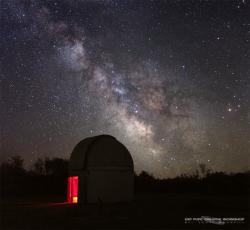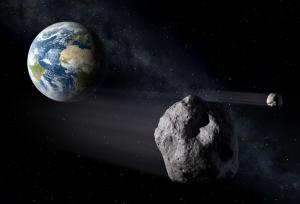
Public Stargazing
- Where:
- Frosty Drew Observatory
- When:
- Friday September 5, 2014 at 7:00 p.m.
- Cost:
- $1 Suggested Donation per Person
Tonight's forecast is calling for partly cloudy skies with fog moving in around 10:00 p.m. We will open the Observatory and Sky Theatre after 7:00 p.m. while keeping a close eye on the sky. Follow @FrostyDrewOBSY on Twitter or Facebook for updates on sky conditions from the Observatory. If skies are clear enough, the telescopes will start off with Saturn and the 85% waxing gibbous Moon. The bright light of the Moon will surely obscure our skyward view of most deep sky objects, though binary stars will be unaffected and on display. Later in the night, Neptune and Uranus will be available for a quick glimpse as long as the skies hold out. If the skies do not offer a viewing opportunity, we will present a slideshow and commentary in the Sky Theatre from 7:00 p.m. - 9:00 p.m. showcasing some of the fantastic celestial objects we have photographed at Frosty Drew.
Late summer brings some excellent viewing of the cosmos, though it also brings fog to the New England coastline. We will take it as it goes and hope for a spot of clear skies.
-------------------------------------------------------------------------
Weekly Happenings
Scott MacNeill
At Frosty Drew we are always commenting on how the bright Moon will close us down early or kick us out of the Observatory. We often speak and write as if the Moon is an annoyance to all us sky watchers while praising nights with no Moon. Well this is a common story among amateur astronomers and astro-photographers because, like the Sun, the Moon will illuminate Earth's atmosphere causing it to become translucent. This increase in atmospheric visibility will limit our view of objects that have a low surface brightness, objects like galaxies, nebulae, and many star clusters. We often forget how awesome the Moon is to observe and that, unlike most other objects, we really can spend an entire night viewing the vast features visible on the lunar surface.
Well this weekend, on Saturday September 6th, an event is taking place that will help make up for all the abuse the Moon gets from the sky watching community. The event will happen over the course of 24 hours and takes place worldwide with thousands of planetariums, observatories, libraries, schools, museums, and science / educational institutions hosting events. The global event is called International Observe the Moon Night and for the fifth consecutive year, Frosty Drew Observatory will be joining in the festivities and open our telescopes to anybody interested in observing the Moon with us.
Starting at 6:00 p.m. Saturday night (weather permitting), we will be showing the Moon in our telescopes. We will have volunteers on hand to answer questions about the Moon and talk about what you see when you look up at Earth's beautiful Moon. In the Sky Theatre, presentations on the Moon will be available. This is your chance to get out there and salute all the amazing things the Moon does for us and, if necessary, make amends for all those nights spent complaining about the beautiful light shining down on us from Earth's only natural satellite. Do it Rhode Island!
On the afternoon of Sunday, September 7th, an asteroid the size of a house will pass Earth at a super close distance of about 25,000 miles. That's about 10% the distance the Moon is from Earth! The asteroid, named 2014 RC, was first identified on August 31, 2014 by the Catalina Sky Survey outside of Tuscon, Arizona and later confirmed by the Pan-STARRS 1 telescope on Maui, Hawaii. The passing, though easily visible in mid-larger aperture backyard telescopes, will happen in the afternoon when viewed from the Northeast USA. So no asteroid spotting for us at Frosty Drew. Regardless, live views will surely be available, like this one at The Virtual Telescope Project. If a freak out moment is starting to happen, rest assured that Asteroid 2014 RC will safely pass by Earth in a doomsday free fashion. Aside from the initial bout of anxiety, close passes like this offer us an excellent opportunity to study Near Earth Asteroids and learn more about their compositions, orbits and better ways to identify and mitigate any potential impact threats in the future.
-Scott


